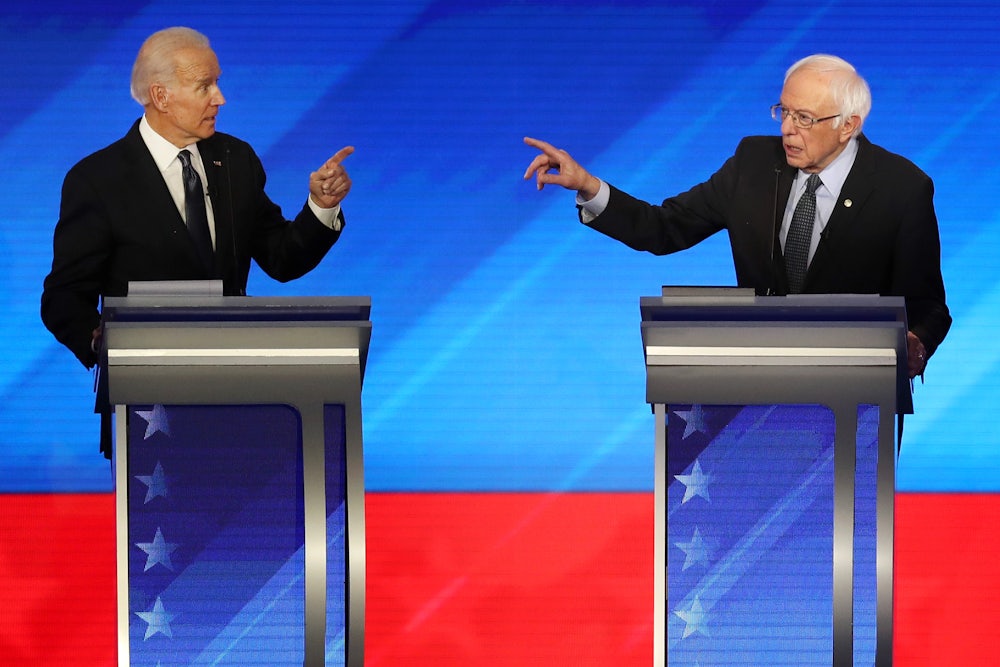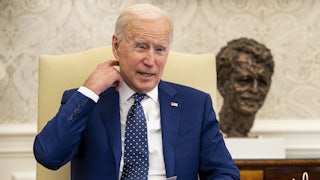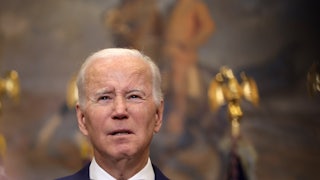If the Republicans were not so busy proving their addiction to a deranged—and now criminally indicted—former president who threatens “death and destruction,” Democrats in Washington might be more alarmed over the tepid reaction to a second term for Joe Biden.
A Monmouth University Poll released last week found that only 25 percent of Democrats and Democratic-leaners want the 80-year-old president to run in 2024. Forty-four percent prefer someone else, but most of them only have a vague idea of whom that might be. And the remainder of Democrats have no strong feelings either way.
This poll is not an outlier, though the problem may be worsening: An Associated Press/NORC survey in early February found that 37 percent of Democrats wanted Biden to run for reelection, a number that had dropped 15 points since the weeks prior to the 2022 midterm elections.
These meh numbers make Biden, who is expected to formally declare for a second term in the coming months, the most lackluster Democratic incumbent since Jimmy Carter. At this point in 1979 (more than a year before the party’s convention), an ABC News poll found that voters preferred Ted Kennedy to Carter for the 1980 Democratic nomination by a lopsided 59–35 percent margin.
And yet, not since the explosion of presidential primaries in the 1970s have the sentiments of a party’s voters mattered as little as they do now. A majority of Democrats may desire someone other than Biden, but they’re petrified by the idea of Trump’s political resurrection and divided about who would make a better nominee. That’s why no Kennedyesque spoiler has emerged this year—sorry, Marianne Williamson—and history shows why the Democrats had better hope it remains that way.
Most rules governing presidential primaries are made to be broken. In the modern era, no one had ever been nominated for president without finishing first (or, in one case, second) in the Iowa caucuses or the New Hampshire primary. That was an unalterable dictum of political success until Biden finished fourth in Iowa in 2020 followed by a dismal fifth-place finish in New Hampshire.
But there is one iron law that has endured since the nineteenth century: No sitting president has ever been reelected after facing a serious challenge for the nomination. If a significant political figure (or even a compelling gadfly) runs in the primaries, then the incumbent is effectively doomed in November or beforehand. Whether the party splinters over ideology or over the challenger’s ego, the result is the same. Four dramatic examples over the last half-century illustrate why.
1968: The Snows of New Hampshire
On the evening of March 31, 1968, at the end of a televised speech to the nation on the raging war in Vietnam, Lyndon Johnson made a stunning announcement, “I shall not seek, and I will not accept, the nomination of my party for another term as your president.” It had been a tightly held secret. LBJ, in fact, had two separate endings to the speech. Vice President Hubert Humphrey (who went on to lose the 1968 election to Richard Nixon) was only informed of Johnson’s final decision midway through the speech.
For all of Johnson’s raging ambition, his reelection campaign effectively died three weeks earlier when Eugene McCarthy—a cerebral, mercurial antiwar Minnesota senator—won more than 40 percent of the vote in the New Hampshire primary. The stunning repudiation of the Vietnam War in the kickoff primary prompted the doomed Robert Kennedy to also enter the race against Johnson in mid-March. After the assassinations of Martin Luther King and Kennedy, the bitterly divided Democrats nominated Humphrey, amid the stench of tear gas at the August Chicago convention.
1976: A Man, A Plan, Panama
With accidental President Jerry Ford limping along with an approval rating under 50 percent throughout almost all of 1975, it was not surprising that he would be opposed for the GOP nomination. But when conservative former California Governor Ronald Reagan challenged Ford in November 1975, influential New York Times columnist James Reston sniffed at the “amusing but frivolous Reagan fantasy.”
After Reagan lost the first five 1976 primaries to Ford, Reston appeared to be right. But powered by a niche right-wing issue (militant opposition to the Panama Canal Treaty relinquishing American sovereignty), Reagan came roaring back in the March 23 North Carolina primary and carried the fight to the floor of the August GOP convention in Kansas City.
While teasing out causation in presidential politics is tricky, Reagan’s apostasy wounded Ford. A late-July Gallup Poll had Jimmy Carter leading the incumbent president by more than a 2-to-1 margin. Ford’s surprising ability to close the gap to almost catch Carter by Election Day had more to do with the Democrat’s sputtering fall campaign than sudden Republican unity.
1980: The Dream Did Die
Ted Kennedy’s ill-conceived primary challenge to Jimmy Carter offers the most relevant illustration of the dangers of internecine partisan warfare. Before he formally declared his candidacy in November 1979, Kennedy muffed an interview with CBS correspondent Roger Mudd, when he proved incapable of coherently answering the ultimate softball question: “Why do you want to be president?”
On the campaign trail, Kennedy also failed to articulate a compelling rationale for running, beyond vague calls for “leadership.” But such was the power of the Kennedy name and legacy that the Massachusetts senator carried the fight all the way to a platform battle at the New York convention. In a memorable speech that was a coda to his presidential ambitions, Kennedy ended by pledging, “The work goes on, the cause endures, the hope still lives, and the dream shall never die.” But equally enduring—and symbolic of Democratic divisiveness—was Kennedy’s refusal to join Carter with their hands raised in unity on the final night of the convention.
1992: Unleashing the Culture War
Unlike presidential challengers such as Reagan and Kennedy, fiery right-wing newspaper columnist Pat Buchanan never held political office. But that did not prevent Buchanan’s quixotic race against incumbent George H.W. Bush in the 1992 New Hampshire primary from being politically devastating. Buchanan, who had been a Richard Nixon speechwriter and a White House aide to Reagan, based his campaign on Bush reversing his 1988 campaign pledge, “Read my lips, no new taxes.”
Buchanan jarred Bush by winning 40 percent of the vote in New Hampshire. But the right-wing incendiary reserved his true damage for the 1992 Republican Houston convention. Winning a prime-time speaking slot after endorsing Bush, Buchanan responded with a “cultural wars” speech against liberal permissiveness so extreme that columnist Molly Ivins cracked that it “probably sounded better in the original German.” Bush lost the 1992 campaign decisively, and Buchanan’s nativist, isolationist, and protectionist platform offered a template for the Trump GOP today.
Despite Biden’s lack of charisma, and legitimate concerns about how his age will play on the campaign trail, there are far worse dangers for the Democrats than the president’s seemingly inevitable bid for a second term. For history teaches us that almost nothing would be more damaging than an out-of-nowhere primary challenge to Biden by a backbench Democrat in Congress or a hedge-fund billionaire with dreams of grandeur.






